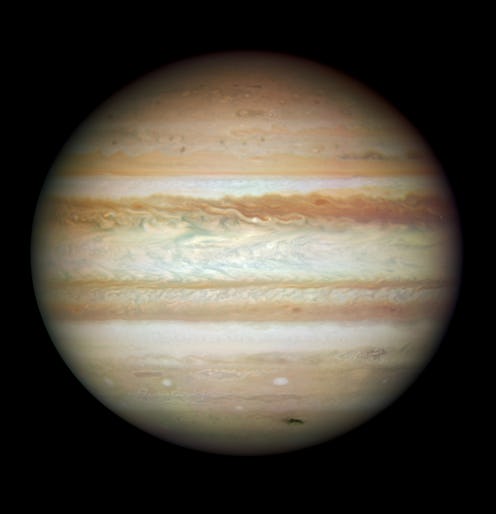News
If You're Wondering Exactly What Juno Is...
No, not like the city in Alaska. Juno is a deep space probe that NASA launched into space five years ago with the mission of reaching Jupiter, and on Monday, it will achieve that goal. The probe is on a nearly decade-long fact finding mission to help scientists understand more about the biggest planet in the solar system, and, through it, more about the universe as a whole.
Juno has two key missions: to figure out how much water is on Jupiter, and to try to determine the makeup of the planet's core. There's no real chance for life on Jupiter, even if there is water, but it should give scientists a clue as to how much water was around in the early days of the solar system. Likewise with the planet's core — if Juno can discover whether Jupiter has a rocky core like Earth's or not, it will tell astronomers a lot about other planets in the Milky Way. However, there's one catch to the otherwise straightforward mission: Jupiter has really intense radiation, even in its orbit. "Jupiter is the planet on steroids in our solar system; everything about it is extreme," Juno principal investigator Scott Bolton told Space.com.
After it reaches Jupiter's orbit, Juno will circle the planet for about a year. That's all it will be able to survive because of Jupiter's intense radioactive atmosphere, which features a magnetic field 20,000 times stronger than Earth's. NASA built a radiation-proof vault around the probe's onboard computer, which should protect it for a while, but the computer is so small that there's not much Juno can do anyway. Because the electronics have to be designed for a high-radiation environment, Juno's computer only has about 256 megabytes of flash memory, less than your smartphone. Juno is also the furthest solar-powered object in space now, another title to tuck under its history-making belt.
The coolest part about the Juno "landing" is that it will reach Jupiter on the Fourth of July. It's pretty amazing to think that nearly 250 years after its founding, America is still expanding its borders and achieving new goals. It's also nice to remember that the United States is still contributing to scientific discovery, and the government makes funds available to learn more about the universe. The Juno mission is a little something extra to be proud of this Independence Day, so make sure you look up to the sky on Monday and see if you can spot Jupiter.
